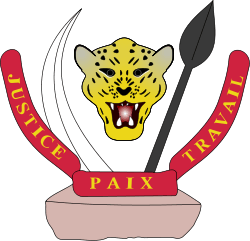Prime Minister of the Democratic Republic of the Congo
| Prime Minister of the Democratic Republic of the Congo | |
|---|---|
|
| |
| Appointer |
Joseph Kabila, as President of the Democratic Republic of the Congo |
| Inaugural holder | Patrice Lumumba |
| Formation | 24 June 1960 |
 |
| This article is part of a series on the politics and government of the Democratic Republic of the Congo |
|
Government |
|
Judiciary |
| Foreign relations |
| United Nations Mission |
The prime minister of the Democratic Republic of the Congo (French: Premier-ministre de la République démocratique du Congo, Swahili: Waziri Mkuu wa Jamhuri ya Kidemokrasia ya Kongo, Lingala: Minisele ya Yambo wa Republiki ya Kɔ́ngɔ Demokratiki), is Congo's head of government.
History
The current prime minister of the Democratic Republic of the Congo is Augustin Matata Ponyo. The position of prime minister was already present in the first government after independence of the Democratic Republic of the Congo, with the first prime minister Patrice Emery Lumumba. Over the years the position's powers and attributions have varied widely, and there were long periods of time under the Mobutu Sese Seko, and the period following the First Congo War, when the position was abolished in 1966. The position was restored by Mobutu in 1977 as the title of "First State Commissioner" which, in reality, was weak in comparison to the pre-war office of Prime Minister, and was occupied by several individuals who were appointed at Mobutu's whim. The office became vacant with Mobutu's forced ouster in 1997.
Aside from the Lumumba government, the Congo (DRC) has known several powerful figures in the position, such as Moise Tshombe who had previously led a secession of his native Katanga province, and Etienne Tshisekedi, the long-time opponent of the Mobutu regime, who was brought to this position three times, by pressure from the people.
The position resurfaced as an institution of the Third Republic's constitution, and Antoine Gizenga was appointed as the first Prime Minister of the Third Republic, on 30 December 2006. Gizenga, one of the few active and living politicians to hail from the DRC's colonial past, was Lumumba's Deputy-Prime Minister in 1960, and served as Prime Minister of a rival national government in rebellion in February 1961.
Description
Under the constitution of the third republic, the prime minister shares the leadership of the executive branch of government, with the president of the Democratic Republic of the Congo, the head of state. The prime minister is appointed by the President, from the party or political group that has the majority in the National Assembly.
The prime minister has a secondary role in the executive branch, when he or she is from the same party as the president, as the head of the executive is constitutionally the President. However, when there is cohabitation (i.e., when the president is of one party while another party controls the National Assembly) the prime minister's importance is enhanced because the president has little power to be exercised by himself or herself alone.
Requirements
The constitution does not expressly outline any direct requirement for this position. The only litmus is the approval by the National Assembly of the government's composition and program, which then leads to the investiture of the government.
See also
Historical: